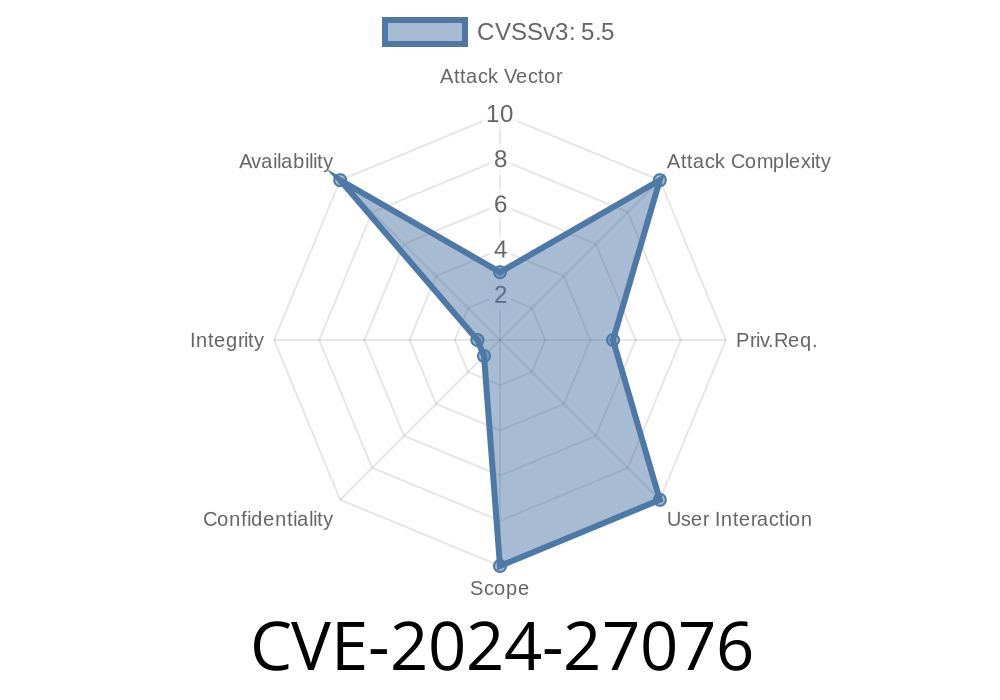A recently patched vulnerability, CVE-2024-27076, has been discovered in the Linux kernel, affecting the media subsystem—specifically, the imx (i.MX) driver for color space conversion (csc) and scaling. This flaw was caused by improper memory management related to the v4l2_ctrl_handler structure, potentially resulting in memory leaks. In this article, we’ll break down how the bug happens, what its impact is, and how it’s been fixed, with code snippets and references for further reading.
What Is CVE-2024-27076?
CVE-2024-27076 is a memory leak in the Linux media subsystem (drivers/media/platform/imx), where memory allocated for video controls (v4l2_ctrl_handler) was not always freed on device release. That means, every time you opened and closed a video device using the affected driver, a small chunk of system memory didn’t get released. Over time—especially in machines where the driver is frequently loaded/unloaded—this could lead to significant memory waste (a leak), eventually exhausting system resources.
Short summary:
Vulnerability: Memory leak
- Component: imx csc/scaler (drivers/media/platform/imx)
What is v4l2_ctrl_handler?
The v4l2_ctrl_handler is a structure used by the Video For Linux 2 (V4L2) framework. It manages controls for video device drivers, like brightness or scaling. When a device driver is initialized, it sets up this handler and allocates memory for its controls.
Normally, this memory must be freed when the device is released (unregistered), otherwise, it accumulates ("leaks") over time.
Here’s a simplified code snippet from the affected driver (before the fix)
struct csc_scaler_device {
...
struct v4l2_ctrl_handler ctrl_handler;
...
};
// Device init
v4l2_ctrl_handler_init(&dev->ctrl_handler, 4);
...
// (Other code mistakenly omits cleanup)
On device release, the code forgot to free the handler's resources
// Device release function
static void csc_scaler_remove(struct platform_device *pdev)
{
// The following line was missing!
// v4l2_ctrl_handler_free(&dev->ctrl_handler);
}
As a result, memory allocated by v4l2_ctrl_handler_init() and later used by the controls was not released.
The fix adds the missing cleanup call
static void csc_scaler_remove(struct platform_device *pdev)
{
struct csc_scaler_device *dev = platform_get_drvdata(pdev);
v4l2_ctrl_handler_free(&dev->ctrl_handler); // <--- FIX
...
}
This simple line ensures the kernel frees all memory associated with the control handler when the driver is unloaded.
Can This Be Exploited?
This vulnerability doesn’t allow attackers to execute arbitrary code or escalate privileges directly. However, a local attacker could trigger the memory leak repeatedly (for example, through automated scripting that loads and unloads the affected video device). Over time, this can exhaust system memory, causing denials of service (DoS) for other processes—potentially leading to a full lockup or crash of the system.
A simple Bash script could exploit the leak
#!/bin/bash
for i in {1..10000}; do
modprobe imx_csc_scaler
rmmod imx_csc_scaler
done
Running this in a loop consumes more memory each time, until the system slows down, or even runs out of memory and crashes.
How Was It Discovered and Fixed?
Linux kernel developers and maintainers routinely audit the code for memory management bugs. CVE-2024-27076 was identified during such audits and was patched with this commit:
> media: imx: csc/scaler: fix v4l2_ctrl_handler memory leak
> Author: Hans Verkuil
> Date: Early 2024
Fix diff (simplified)
+ v4l2_ctrl_handler_free(&dev->ctrl_handler);
## How To Fix / Mitigation
- Update the Linux kernel: If you use hardware needing this driver, update to a kernel version including this patch (mainline from Feb/Mar 2024 or after).
- Manual check: If you manage your own kernel builds, verify the presence of v4l2_ctrl_handler_free() in the device remove function.
References
- Mainline kernel commit fixing CVE-2024-27076
- CVE-2024-27076 at cve.org *(listing may take time to update)*
- V4L2 Documentation
- Linux kernel mailing list discussion
Conclusion
CVE-2024-27076 is a good example of how even small mistakes in memory handling in kernel drivers can cause resource leaks—and why defensive programming and regular audits matter, especially in low-level system code. If you maintain Linux systems, especially with media hardware or embedded devices using the i.MX family, now’s the time to update.
*Written exclusively for you—feel free to share with your infosec or sysadmin colleagues!*
Timeline
Published on: 05/01/2024 13:15:51 UTC
Last modified on: 12/23/2024 15:08:03 UTC
